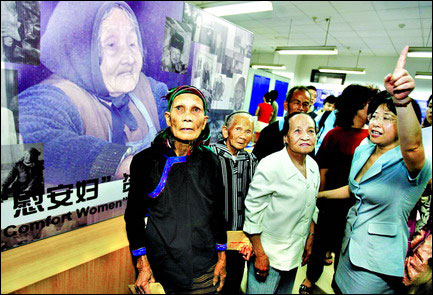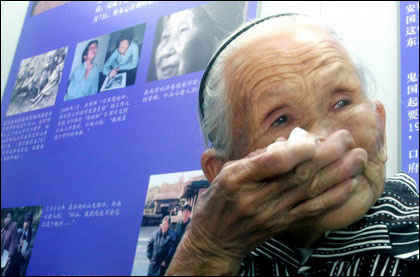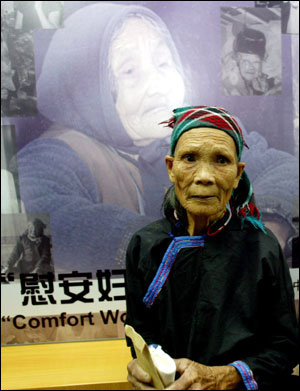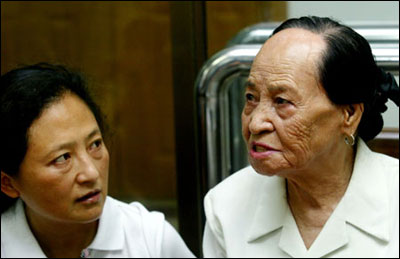| Home / China / National News | Tools: Save | Print | E-mail | Most Read |
| Shanghai Opens Comfort Women Archives |
| Adjust font size: |
China inaugurated its first archives on comfort women on Thursday at Shanghai Normal University.
Fomer comfort women attend the opening ceremony of China's first archives on comfort women in Shanghai on Thursday. Forty-eight display boards and 80 exhibits were shown in the archives, including wooden sculptures of Mount Fuji taken from the Daiichi Salon in Shanghai - the world's first comfort station set up by the Japanese invading army, audio recordings and written accounts by Chinese comfort women, disinfectants that Lei Guiying, a former comfort woman in Nanjing, took when she fled the brothel where she was forced to be a sex slave, boxes of condoms, and pictures of Japanese soldiers. The archives also contain documents on 158 comfort stations in Shanghai and 67 stations in southern Hainan Province. "This is the third set of archives on comfort women in the world - the other two were established in Tokyo and Seoul," said Su Zhiliang, professor and director of the Chinese Comfort Women Research Center at Shanghai Normal University. Su said their research shows there were 200,000 comfort women in China, but only 47 are still alive and have said publicly that they are comfort women. It is believed there may be many more who have remained silent. Lei Guiying, one of the few remaining known comfort women who survived the war, died of a brain hemorrhage on April 25 at the age of 79. In an interview in March with the Times newspaper, Lei said that she was ready to file a case against the Japanese government for its war crimes. "We have set up the archives so people are aware of the victims who are still alive and to remind the Chinese people that although years have passed, the comfort women have not become part of the past," Su said. Three former comfort women, Wan Aihua from Shanxi, Lin Yajin from Hainan, and Wei Shaolan from Guangxi, attended the opening ceremony. Wei was accompanied by her son Luo Shanxue, born as a result of forced relations with a Japanese soldier.
"I want to redress the injustice for me and for all my sisters who suffered, which was why I came forward and admitted that I was once a sex slave for the Japanese military," 79-year-old Wan said. "The exhibits tell us how beauty was ruined and lives devastated, and how these women have endured so much but are still fighting for their lives and dignity," said Wang Xuan, a Chinese woman who heads the delegation of plaintiffs demanding an apology and compensation from the Japanese government over the germ warfare.
Wan Aihua told her horrible experiences as a former comfort woman to Wang Xuan, head of a delegation of plaintiffs demanding an apology and compensation from the Japanese government over the germ warfare. The plaintiffs' appeal was dismissed in May by the Japanese Supreme Court, which upheld the rulings that the current Japanese government is not liable for compensation demands from foreign citizens for wartime actions. Wang said they would continue the lawsuit and appeal to the UN Commission on Human Rights. The exhibition was opened two days before the 70th anniversary of the "July 7 Incident," which marked the beginning of the War of Resistance against Japanese Aggression in China, and will be open to the public from 9: On Tuesday, a group of Chinese researchers investigating the comfort women issue released a report saying one comfort station was still being used by the Japanese military in China in 1947, two years after Japan surrendered. On June 28, Chinese Foreign Ministry spokesman Qin Gang urged the Japanese government "to seriously and properly resolve" the issues of comfort women and forced Chinese laborers during World War II. Qin made the comments in response to a bill passed by a US House panel on June 26, urging Japan to acknowledge formally and accept responsibility for the sexual exploitation of "comfort women" by the Japanese military during World War II.
Cheng Fei (right), adopted daughter of deceased former comfort woman Yuan Zhulin, shows things left behind by her foster mother, with her eyes full of tears.
A visitor looks at exhibits at the archives. (Xinhua News Agency July 6, 2007) |
| Tools: Save | Print | E-mail | Most Read |
 |
| Related Stories |





